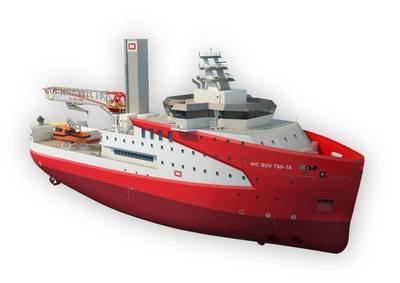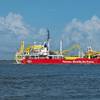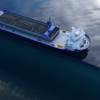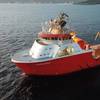Connecting the Dots to Create Intelligent SOVs
The development of autonomous vessels is a hot topic in shipbuilding. This is certainly the case for the service operation vessels (SOV) being developed at Royal IHC (IHC). In our case, the word 'autonomous’ stands for ‘intelligent’ vessels, designed to support the crew in their operations on board.
SOVs can spend many years at the same offshore wind farm to support the maintenance of the turbines. Daily tasks include visits to the turbines to provide access via the motion-compensated gangway. We believe that we can automate the tasks of sailing through the wind farm, approaching the turbine and landing the gangway, to the extent that the system executes these tasks autonomously, while the duty officer approves and supervises the actions. In this way, repetitive tasks are automated while the supervisor oversees the operations.
The development of an autonomous system for us means connecting different components that already exist in the IHC ecosystem. The IHC Dynamic Positioning system provides the equipment to accurately navigate the SOV through the wind farm and maneuver closely to the wind turbines. The Path Planner converts the required list of daily turbine visits into the optimal path, while taking weather conditions and vessel characteristics into account. The workability tool calculates the motions of the vessel and gangway in specified weather conditions.
All these parts are linked together by the intelligent software developed for this project, which is called the ‘Mission Master’. Although these parts are developed in-house it is still a challenge to get them connected and develop them into the right sequence of events.
In a parallel trajectory, MARIN is testing the SOV model on powering, seakeeping behavior and dynamic positioning capabilities. This will give us an excellent insight into the performance of the vessel and will allow the SOV to be accurately modeled in the simulator.
The main deliverable of this project is a simulator where the different components that make up the intelligent vessels are fully integrated by their actual control systems and displayed in user-friendly graphics. The simulator will then be used to demonstrate the functioning of an autonomous SOV to external parties and run benchmarks to compare its performance with more conventional SOVs. We expect to see significant savings in both time and fuel consumption.
One of the main challenges for this type of innovation is the regulatory environment. We have discovered that the regulatory framework is still very much under development for autonomous vessels. In our discussions with industry bodies and classification societies, there is a unanimous consensus that these systems will be the future. It just takes time to update the regulatory framework in accordance with that – something that is easy to forget when looking at these systems purely from an engineering perspective.
Another area in which we are monitoring external developments is regarding ‘object detection and collision avoidance’ systems. These systems identify objects at sea and may trigger navigational maneuvers when deemed necessary. Since there are already several suppliers of these systems, our Mission Master is designed to connect to these systems and use their input for navigation.
Once the simulator has been delivered at the end of 2020 we will start preparing to move into a new phase, which is to build a working prototype of the autonomous system that can be installed on a vessel. We will need a ship owner to team up with us and hopefully enter a subsidized program. We will then gradually phase in the intelligent components on the vessel. This is going to be a multi-year process, which will eventually lead to a safer and more economic operation.
The author
Jeroen Hollebrands is product manager - special offshore vessels at Royal IHC.
This article has been reprinted with permission from Royal IHC.













